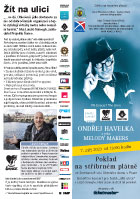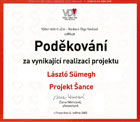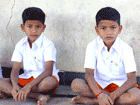
WHO ARE WE?, History
Projekt Šance history began in 1995.
László Sümegh knew he wanted to help. He knew about young people who were living on the streets. He wanted to find a way to help them. Officials didn’t take him seriously; back then, it was immediately clear that László was a bit different (an artist to be brief: long hair, exuberant and especially, full of plans). “You’ll get bored in two weeks or a month…” they told him.
They were wrong.
He first received support from NROS (Civil Society Development Foundation), but over time gained the confidence of other experts and authorities (attending numerous specialist seminars both here and abroad). He began cooperating with the National Institute of Public Health– National Reference Laboratory for AIDS and hit the street to begin testing future clients’ saliva for HIV/AIDS antibodies. This programme is supported by the National Programme for the Fight against AIDS CZ, which is supported in turn by the Ministry of Health CZ. It was hard in the beginning. His future clients were unsure where to put him. He didn’t want anything from them, but brought them things and explained they didn’t have to live like this. He promised them a centre where they could come for a meal and wash their clothes. They didn’t believe him at first; it took a while before they accepted him. Sometimes he spent entire days and nights with them on park benches, going where they lived; some still call him “mum” or “dad” to this day (depending on who he replaces for them…).
And it was because he managed to work his way into their midst and gain their trust /he was there for them – he was one of them/, that he is held in particularly high respect by experts. According to Peter Pöth, a physician and psychiatrist who graduated from Harvard University and published a study on the sexual exploitation of Czech children, László is the only person who tried and succeeded in coming close to boys living on the street in Prague (viz. The Prague Post).
After working in the community for several years, László won the support of the City District of Prague 1 and following long tribulations and constantly defending his work before the authorities, he finally met his promise and opened a small, but all the cosier room as an advisory centre for clients in 1997. It was actually more of a den (as Petr Novotný said in December 2002 on a visit to the centre as part of the Guest of the Month programme), but it seemed to suit the clients. When you live on the street, you don’t have high demands.
A few years later however, there was no longer enough space and a dream was born of a building where workshops could be built, with a large club room, room for alternative education, therapeutic facilities, etc. But let’s not get ahead of ourselves, that small room in 1997 gave birth to the citizens’ association, Projekt Šance.
The Street Work Centre underwent reconstruction in 2005/2006 and a shower cubicle was built for clients. There are two washing machines and two dryers at the Street Work Centre. Even if clients arrive dirty, they can leave clean. The Street Work Centre provides all this as part of the EMERGENCY ASSISTANCE programme.
Projekt Šance history began in 1995.
László Sümegh knew he wanted to help. He knew about young people who were living on the streets. He wanted to find a way to help them. Officials didn’t take him seriously; back then, it was immediately clear that László was a bit different (an artist to be brief: long hair, exuberant and especially, full of plans). “You’ll get bored in two weeks or a month…” they told him.
They were wrong.
He first received support from NROS (Civil Society Development Foundation), but over time gained the confidence of other experts and authorities (attending numerous specialist seminars both here and abroad). He began cooperating with the National Institute of Public Health– National Reference Laboratory for AIDS and hit the street to begin testing future clients’ saliva for HIV/AIDS antibodies. This programme is supported by the National Programme for the Fight against AIDS CZ, which is supported in turn by the Ministry of Health CZ. It was hard in the beginning. His future clients were unsure where to put him. He didn’t want anything from them, but brought them things and explained they didn’t have to live like this. He promised them a centre where they could come for a meal and wash their clothes. They didn’t believe him at first; it took a while before they accepted him. Sometimes he spent entire days and nights with them on park benches, going where they lived; some still call him “mum” or “dad” to this day (depending on who he replaces for them…).
And it was because he managed to work his way into their midst and gain their trust /he was there for them – he was one of them/, that he is held in particularly high respect by experts. According to Peter Pöth, a physician and psychiatrist who graduated from Harvard University and published a study on the sexual exploitation of Czech children, László is the only person who tried and succeeded in coming close to boys living on the street in Prague (viz. The Prague Post).
After working in the community for several years, László won the support of the City District of Prague 1 and following long tribulations and constantly defending his work before the authorities, he finally met his promise and opened a small, but all the cosier room as an advisory centre for clients in 1997. It was actually more of a den (as Petr Novotný said in December 2002 on a visit to the centre as part of the Guest of the Month programme), but it seemed to suit the clients. When you live on the street, you don’t have high demands.
A few years later however, there was no longer enough space and a dream was born of a building where workshops could be built, with a large club room, room for alternative education, therapeutic facilities, etc. But let’s not get ahead of ourselves, that small room in 1997 gave birth to the citizens’ association, Projekt Šance.
At the end of 2002 Projekt Šance won a tender for the lease of a building in the City District of Prague 5, which we called Dům Šance.
Three mothers-artists became the patrons of the new project: Marta Kubišová, Marie Rottrová and Tána Fischerová.
The first attempt to open a WORKSHOP at Dům Šance was realised in 2006. The workshop managed to open all week on a trial basis from June 2007.
The WORKSHOP has three godfathers: Petr Muk, Petr Janda and Petr Novotný.
Three mothers-artists became the patrons of the new project: Marta Kubišová, Marie Rottrová and Tána Fischerová.
The first attempt to open a WORKSHOP at Dům Šance was realised in 2006. The workshop managed to open all week on a trial basis from June 2007.
The WORKSHOP has three godfathers: Petr Muk, Petr Janda and Petr Novotný.
The Street Work Centre underwent reconstruction in 2005/2006 and a shower cubicle was built for clients. There are two washing machines and two dryers at the Street Work Centre. Even if clients arrive dirty, they can leave clean. The Street Work Centre provides all this as part of the EMERGENCY ASSISTANCE programme.






